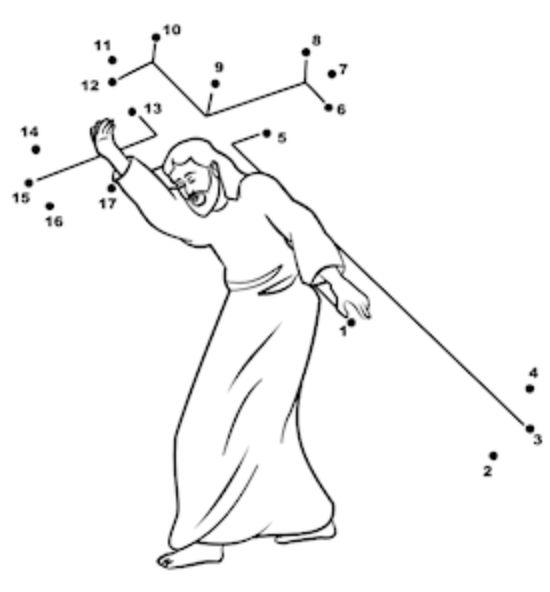Connecting The Dots
As a child, I loved games that involved connecting the dots. I always thought it was so cool to start off with a bunch of dots that appeared to be random and watch the mystery resolved as the dots were connected.

Growing in one’s faith is also like a game of connecting the dots. That's because it involves a process of discovering the relationship between the things Christian are supposed to do and the meaning behind those things.
Take the Sacraments as an example. On their own, they’re like a floating dot. Bread and wine are but bread and wine, waiting to be connected to something. That’s exactly what Jesus did on the night He was betrayed when He connected the Pascal meal to His death. This connection made their meaning clear.
Of course, in the game of connecting the dots, there is always the danger that we might connect the wrong dots. Likewise, in the Christian life, we must avoid connecting God’s dots to the wrong things. For example, some have mistakenly connected the baptism dot to their salvation when what it should be connected to The Great Commission. When we make the right connection, we understand that it’s supposed to be a witness to a watching world, performed by those who have already been saved.
Once the dot of baptism is connected to the right thing, God’s intentions become evident.
"And that water is a picture of baptism, which now saves you, not by removing dirt from your body, but as a response to God from a clean conscience. It is effective because of the resurrection of Jesus Christ" (1 Peter 3:21).
At A Loss For Words
Laura McPherson writes:
BEFORE THE TURN of the next century, more than half of India’s 780 languages may die out. In this respect, India can be seen as a microcosm of the world, with experts warning that thousands of little-spoken languages are at risk for extinction within the century.
These reports might act as a call to keep teaching these languages to new users and ensure they are passed on to the next generation. But we have to be realistic, too. Without an unlikely transformation in political, socioeconomic, and ethnic conditions, it is naïve to think we can stem the tide of language death.
Yet, for obvious reasons, none of the research touches on the extinction of perhaps the most important language of all—prayer.
As our societies become more and more secularized, the proliferation of the global language of secular humanism threatens to swallow up the spiritual dynamic of prayer, as it sweeps across the globe.
Yet those who desire to commune with God need never fear the death of the language required. God hears our hearts. He knows our needs before we can even express them (Matthew 6:8). And when we don’t even know how to pray, “The Spirit of God Himself intercedes for us with groans that words cannot express” (Romans 8:26)
Personalizing Your Spiritual Diet
Jaime Bender for The Grapevine writes:
You all know the old adage: What's good for the goose is good for the gander.
Well, throw that one out and try out this new, updated proverb: What lowers the blood sugar of the goose may raise the blood sugar of the gander.
Not quite as catchy, we know. But scientists say that looking at foods in a highly personalized way – rather than prescribing a one-size-fits-all diet – may be the key to eating more healthfully and avoiding diabetes and obesity.
... For example, in one study subject, the researchers found that blood-sugar levels rose sharply after eating bananas but not after eating cookies. In a different participant, the exact opposite occurred. In another example, a diet high in glucose caused a rise in glucose levels in some people, while in others, blood-glucose levels spiked after they ate white bread, but not after glucose.
Segal said the results of this study supports the need "to develop personal dietary recommendations that can help prevent and treat obesity and diabetes, which are among the most severe epidemics in human history.” For the layman, that just means that you shouldn't expect a diet to work for you just because it works for your friends, or your mother, or your boss.
Bender concludes by suggesting that we visit our doctors to discover what type of diet is best for each of us. Only then will you be able to "contour and personalize your diet."
These surprising results affirm what the Bible has maintained all along—each of us has been uniquely designed by our Creator. From the start, there has never been anyone like you. And, along with all of the details of who you were made to be, is the unique calling God has placed on your life. No one else has been called and equipped to face the challenges and opportunities that you are intended to meet during the course of your life.
That being so, don’t expect the spirituality that works for your friends, or your mother, or your boss to work for you. Don’t even expect the spirituality that worked for you yesterday to be what you should turn to tomorrow.
The manna that came down from heaven was unique to the day on which it was given. So it will be for each of us as we seek what we need from God in order to meet the challenges of each new day. Your spiritual health needs are as individual as you are, so spend time in God’s Word where you’ll find instructions, exhortations and commands that can be contoured into a very personalized diet.
“I am the living bread that came down from heaven. Whoever eats this bread will live forever. This bread is my flesh, which I will give for the life of the world” (John 6:51).